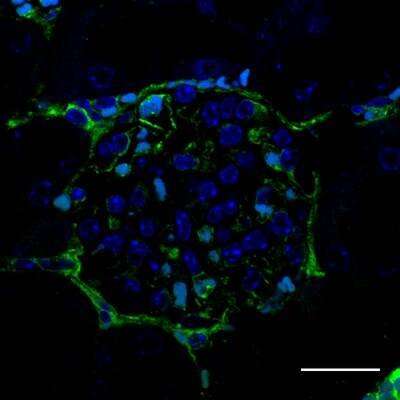How a common viral infection can lead to autoimmunity

Researchers in Dr. Leona Gilbert's research group at the University of Jyväskylä have proposed a novel mechanism for how a common viral infection could lead to an autoimmune disease. Dr. Gilbert's team demonstrated for the first time how viral components triggered cellular and ultimately tissue damage in mice, thus, providing an answer to a missing link between an infection and autoimmunity. The research article was published in the Journal of Infectious Diseases in May.
Autoimmune diseases can be debilitating and difficult to treat, because instead of attacking foreign invaders, like bacteria or viruses, the immune system battles against the body's own cells. Some examples of common autoimmune diseases include rheumatoid arthritis, systemic lupus erythematosus and fulminant liver failure, and about five percent of the world's population suffers from autoimmune diseases.
Recently, some common bacteria and viruses have been linked to autoimmune diseases but the exact mechanisms of how the pathogens cause these diseases have been a mystery.
Human parvovirus B19 has also been linked autoimmune diseases such as systemic lupus erythematosus and rheumatoid arthritis. Human parvovirus B19 is a very common virus that can be symptomless or cause flu-like symptoms.
"Human parvovirus B19 NS1 protein is known to cause cell death. Normally, cell death occurs even in healthy cells as a way of renewing old or damaged cells. However, during a microbial infection the pathogen can cause an excessive amount of cell death, thus, burdening the immune system," says Dr. Leona Gilbert.
Parvoviral B19 induced apoptotic bodies stimulated an immune reaction against self-DNA in mice
In the case of a human parvovirus B19 infection as demonstrated by Dr. Leona Gilbert's research team and others, the virus causes cell death in the host, which initiates the formation of apoptotic bodies containing both viral proteins and host cellular DNA. An autoimmune reaction is initiated as the immune system begins an attack against these particles believing the host cellular DNA to be of foreign origin.
"Here we have a vicious cycle of our immune system attacking our own DNA that causes more and more cell damage leading to tissue damage in major organs. In addition, this model system also showed that the animal developed an immune response against its own DNA, a signature characteristic of systemic lupus erythematosus," comments Dr. Gilbert.
According to the researchers, these results clearly demonstrate the importance of quickly resolving viral infections in order to prevent the development of chronic conditions such as autoimmune diseases.
"We hope our research can be utilized in the future for the development of novel anti-viral therapeutics for prevention and treatment of autoimmune diseases associated with viral infections," says Dr. Gilbert.
More information: Kanoktip Puttaraksa et al. Parvovirus B19V Nonstructural Protein NS1 Induces Double-Stranded Deoxyribonucleic Acid Autoantibodies and End-Organ Damage in Nonautoimmune Mice, The Journal of Infectious Diseases (2018). DOI: 10.1093/infdis/jiy614



















